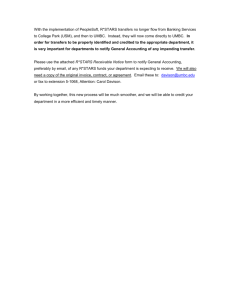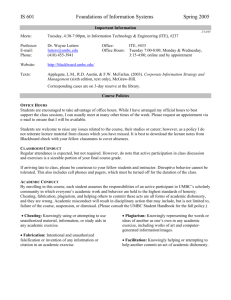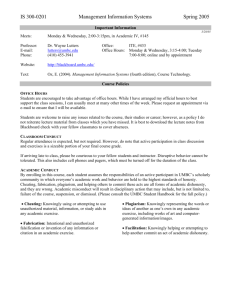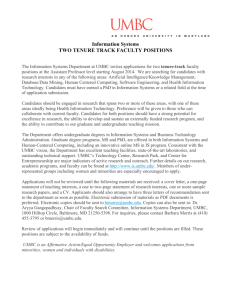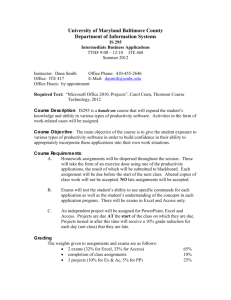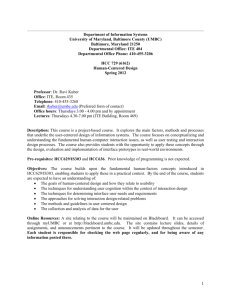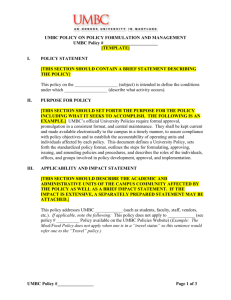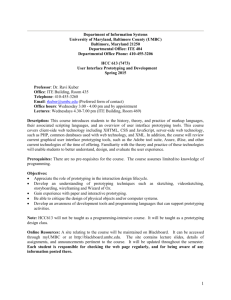Department of Information Systems University of Maryland
advertisement
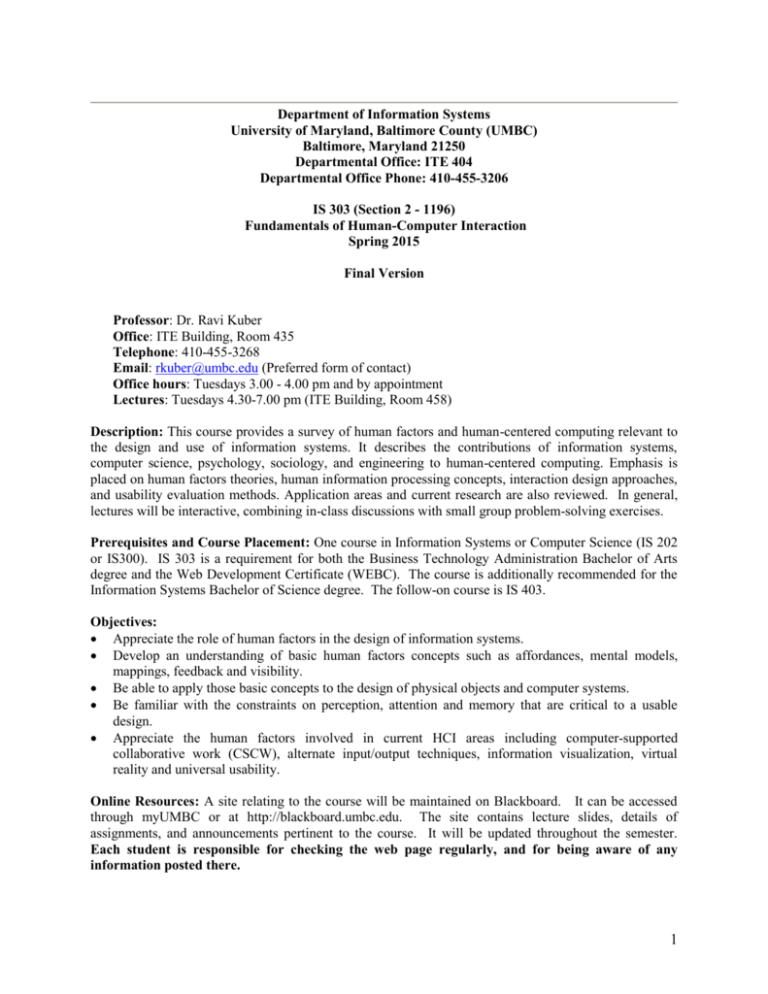
Department of Information Systems University of Maryland, Baltimore County (UMBC) Baltimore, Maryland 21250 Departmental Office: ITE 404 Departmental Office Phone: 410-455-3206 IS 303 (Section 2 - 1196) Fundamentals of Human-Computer Interaction Spring 2015 Final Version Professor: Dr. Ravi Kuber Office: ITE Building, Room 435 Telephone: 410-455-3268 Email: rkuber@umbc.edu (Preferred form of contact) Office hours: Tuesdays 3.00 - 4.00 pm and by appointment Lectures: Tuesdays 4.30-7.00 pm (ITE Building, Room 458) Description: This course provides a survey of human factors and human-centered computing relevant to the design and use of information systems. It describes the contributions of information systems, computer science, psychology, sociology, and engineering to human-centered computing. Emphasis is placed on human factors theories, human information processing concepts, interaction design approaches, and usability evaluation methods. Application areas and current research are also reviewed. In general, lectures will be interactive, combining in-class discussions with small group problem-solving exercises. Prerequisites and Course Placement: One course in Information Systems or Computer Science (IS 202 or IS300). IS 303 is a requirement for both the Business Technology Administration Bachelor of Arts degree and the Web Development Certificate (WEBC). The course is additionally recommended for the Information Systems Bachelor of Science degree. The follow-on course is IS 403. Objectives: Appreciate the role of human factors in the design of information systems. Develop an understanding of basic human factors concepts such as affordances, mental models, mappings, feedback and visibility. Be able to apply those basic concepts to the design of physical objects and computer systems. Be familiar with the constraints on perception, attention and memory that are critical to a usable design. Appreciate the human factors involved in current HCI areas including computer-supported collaborative work (CSCW), alternate input/output techniques, information visualization, virtual reality and universal usability. Online Resources: A site relating to the course will be maintained on Blackboard. It can be accessed through myUMBC or at http://blackboard.umbc.edu. The site contains lecture slides, details of assignments, and announcements pertinent to the course. It will be updated throughout the semester. Each student is responsible for checking the web page regularly, and for being aware of any information posted there. 1 Reading Materials: The following book will be required for the class to supplement lectures: Rogers, Y., Sharp, H. and Preece, J. Interaction Design: Beyond Human-Computer Interaction (3rd edition). John Wiley & Sons, Inc., 2011, ISBN 978-0-470-66576-3. The book can be purchased from the campus bookstore or from other retailers. Other readings will be made available via the class Blackboard site. Grading: The final grade will reflect the student’s achievement of the learning objectives. This will be measured through two assignments (group-based), two exams and class participation. The distribution of percentages among these components is given below: Assignment 1 (Group) Assignment 2 (Group) Midterm Exam Final Exam Participation 20% 30% 22% 22% 6% Grading Standards: IS/HCC instructors are expected to have exams and evaluations which result in a reasonable distribution of grades. With respect to the final letter grades, the University’s Undergraduate Catalogue states that, “A indicates superior achievement; B, good performance; C, adequate performance; D, minimal performance; F, failure”. There is specifically no mention of any numerical scores associated with these letter grades. Final letter grades in this course conform to the University’s officially published definitions of the respective letter grades. In accordance with the published University grading policy, it is important to understand that final letter grades reflect academic achievement and not effort. While mistakes in the arithmetic computation of grades and grade recording errors will always be corrected, it is important to understand that in all other situations final letter grades are not negotiable and challenges to final letter grades are not entertained. Historical data suggests an “A” may be in the 91-100 range, a “B” may be from 81-89 and “C” grades range from 70-80. All points from assignments and exams are additive for the semester. Each student starts at zero points which is an “F”, any other grade must be earned. Assignments: The assignments will result in a total of 50% of your semester grade. A maximum of 50 points can be awarded for Assignments 1 and 2. When submitting an assignment, be aware that numerous delays can occur. For example, computer failures, system performance issues, printing problems and other commitments. It is essential that students are able to organize their time effectively, to ensure that deliverables are handed-in on time. If an assignment is not in on time, it may possibly be accepted following the due date with an accompanying reduction of the 50% of the earned grade. If you do not hand-in an assignment, you will receive a zero grade. Writing Reports and Deliverables Page limits have been specified for each assignment (excluding cover page, table of contents and references). These should be adhered to, as the instructor will not read further than the page limits specified. Staple the report together, rather than using a folder. On a cover page, clearly present your name or names of those in the group, email address and title of the assignment. Use appropriate formatting (text size 10-12 point) and always number pages. Ensure that work is proof-read. 2 When citing or quoting existing work, always include appropriate references. references are consistent in style (e.g. Harvard, Vancouver or APA formats). Ensure that Exams: There will be a mid-term exam and a final exam. The exams will result in a total of 44% of your semester grade. Each exam is 22 points. You may not use calculators, computers or other electronic devices for exams. You must bring picture ID. The exams will cover material from the lectures, readings and assignments. If you miss an exam, you will receive a zero grade. Class Format and Participation: For most classes, class participation is listed as a factor that contributes to a students’ overall grade for a class. Performing assigned reading and participating in classroom discussions, presentations and activities are considered normal and expected contributions to the class. To receive an above average grade a student must participate beyond this norm in a noteworthy way. This participation may occur in the classroom or outside of class. One example of this could be active participation in discussions on the class Blackboard site. Failure to contribute sufficiently in or outside class will result in a lower than average grade. Lateness to class may affect this grade. If you miss a class, you are responsible for getting the relevant notes and hand outs to help you prepare for the exams. Group Work: All students are required to participate equally in project work. If one or more student(s) are not performing their fair share of work, their marks will be reflected accordingly. Course Policies: Assignments: Submissions are due in class on the specified dates. Communication: Feel free to contact me by coming to my office (either during my office hours, or by making an appointment). You are also encouraged to send me email (rkuber@umbc.edu). Make sure you add “IS 303” in the subject of the email and you use your UMBC email account. Emails sent to me from non-UMBC providers (e.g. verizon.net, gmail.com, comcast.net, etc.) may be filtered out and never arrive in my mailbox. Make-up Exams: There will be NO make-up exams unless an emergency occurs and an official document is submitted, verified, and pre-approved by the instructor. Notify the instructor immediately and before the class exam takes place. Important Note: Having multiple exams in the same day does not constitute a valid reason for a make-up exam. Re-grading: I will review any graded exam or assignment if you believe the grade you received was not appropriate. You have one week after the graded assignment is delivered to the class, to return it to me with a written statement discussing why you believe the item in question deserved a different grade. Please note that the entire assignment will be reviewed and your final assignment grade may be raised or lowered as a result of the review. Extra Credit: Simply stated, it does not exist, especially on an individual basis. Absence: In the case of absence due to emergency (e.g. illness), religious holiday, or participation in an official UMBC function, it is the student’s responsibility to confer with the instructor regarding the absence and missed work. Readings: Students are expected to read the materials that will be discussed in the class before the class meeting. Cell phones and beepers: All cell phones and beepers must either be turned off or set to a silent method of operation (e.g., vibrating rather than beeping). If you must answer a call, please leave the classroom. As with arriving late, if you disrupt the class you will be asked to leave the classroom. Academic integrity: By enrolling in this course, each student assumes the responsibilities of an active participant in UMBC's scholarly community in which everyone's academic work and behavior are held to the highest standards of honesty. Cheating, fabrication, plagiarism, and helping others to commit these 3 acts are all forms of academic dishonesty, and they are wrong. Academic misconduct could result in disciplinary action that may include, but is not limited to, suspension or dismissal. To read the full Student Academic Conduct Policy, consult the UMBC Student Handbook, the Faculty Handbook, or the UMBC Policies section of the UMBC Directory. Acts of Academic Misconduct are defined as the following: Cheating: Knowingly using or attempting to use unauthorized material, information, or study aids in any academic exercise. Fabrication: Intentional and unauthorized falsification or invention of any information or citation in an academic exercise. Facilitating Academic Dishonesty: Intentionally or knowingly helping or attempting to help another commit an act of academic dishonesty. Plagiarism: Knowingly representing the words or ideas of another as one’s own in any academic exercise, including works of art and computer-generated information/images. Available Support Services: Utilize the resources that are provided to you by the University. Besides, you pay for them through your tuition, so why not to use them? The UMBC Writing Center is a resource I highly recommend to all students who need some help in writing. Blackboard. Various types of information will be posted on Blackboard, ranging from external links to a specific article relevant to the course, to internships available for IS students. Check the “Information” area in the course Blackboard site. UMBC is committed to eliminating discriminatory obstacles that disadvantage students based on disability. Student Support Services (SSS) is the UMBC department designated to receive and maintain confidential files of disability-related documentation, certify eligibility for services, determine reasonable accommodations, develop with each student plans for the provision of such accommodations, and serve as a liaison between faculty members and students regarding disability-related issues. If you have a disability and want to request accommodations, contact SSS in the Math/Psych Bldg., room 213 or at 410-455-2459. SSS will require you to provide appropriate documentation of disability. If you require accommodations for this class, make an appointment to meet with me to discuss your SSS-approved accommodations." Inclement Weather In case of inclement weather, check the main UMBC Webpage (http://www.umbc.edu) to see whether UMBC is closed and classes are cancelled. Any work due on a class date that has been cancelled due to inclement weather will be due the next class meeting. Using Lab Computers During lab times, it is essential that computers are used for activities relating to class activities, and not for personal or entertainment purposes. This includes using the computer for email, instant messaging, chatting, surfing the Web, and other activities which are not relevant during the class. Students who indulge in any of the above will be asked to leave the classroom for the reminder of the session and a record will be made of the incident. Class Evaluations Information Systems Department Class evaluations will be filled out online. You are strongly encouraged to fill out the evaluations online at the end of the semester and will be notified accordingly. 4 Tentative Schedule: Below is a tentative schedule of lecture topics and exams. I reserve the right to adjust this schedule for any reason, but I will make every effort to advise you of any changes well in advance. Please note that for some sessions, I may be unavailable due to a scheduling clash (marked with an asterisk). Another instructor may take the class, or alternatively students will be expected to perform the work set for the session independently. The work will be then discussed either on the Blackboard messageboard or in the next class. Date 1 2 3 4 5 6 7 8 9 1/27 2/3 2/10 2/17 2/24 3/3 3/10 3/17 3/24 3/31 4/7 4/14 10 4/21 11 * 4/28 5/5 12 13 * 5/12 5/19 Topic Accompanying readings (read in advance of lecture) Introduction Why Good Design Matters Rogers, Sharp and Preece – pp.1-25 Design of Everyday Things & Mental Models Rogers, Sharp and Preece – pp.26-30, pp.86-88 Understanding the Needs of Users Establishing Requirements through Data Gathering Visual Design and Design Rules Interface design using development software Rogers, Sharp and Preece – pp. 65-85 Assignment 1: Critique an Everyday Thing Rogers, Sharp and Preece – pp. 352-386 Dix et al. – Chapter 7 (available on Blackboard) Notes on Blackboard Hand-in Assignment 1 (1 hard copy of report per group) Review for Exam 1 Spring Break – No Class Mid-term Exam Prototyping Time for Assignment 2 Evaluation Techniques Time for Assignment 2 Universal Usability & Internationalization of Interfaces Time for Assignment 2 Quality of Service, Information Search & Visualization. Time for Assignment 2 Instructor at conference – No class Communication & Collaboration Direct Manipulation & Multimodal Interactions Time for Assignment 2 Review for Exam 2 Exam 2 (3.30-5.30pm as per Registrar’s schedule) Assignments Set/Collected Rogers, Sharp and Preece – pp. 389-400, pp. 418-428 Rogers, Sharp and Preece – pp. 476-500, pp. 505-521 Assignment 2: Interaction Design Lifecycle No reading assigned Shneiderman & Plaisant Chapters 11, 13 & 14 (Available on Blackboard) Rogers, Sharp and Preece – pp. 100-126, pp. 157-180, pp. 188-217 Hand-in Assignment 2 (1 hard copy of report per group) 5
